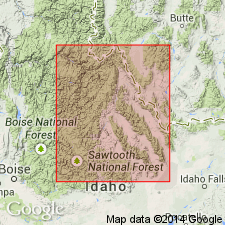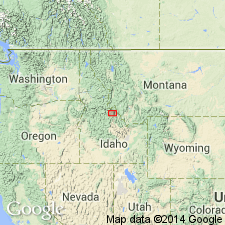
- Usage in publication:
-
- Hayden Creek diamictite beds
- Modifications:
-
- Named
- Dominant lithology:
-
- Diamictite
- AAPG geologic province:
-
- Northern Rocky Mountain region
Summary:
Intended as an informal name applied to diamictite beds in Lemhi Group exposed in vicinity of Hayden Creek, Lemhi Co, ID, Northern Rocky Mountain region. No type locality designated. Composed of matrix-supported green, gray, white, buff and purple argillite, siltite, sandstone, chert, and other rock fragments. The very poorly sorted clasts range from sand size to 10 inches long, and exhibit all variations of roundness and composition. Matrix is composed of sericite, fine-grained quartz and chlorite. Fresh surfaces are greenish gray to dark greenish gray. Shales with green and gray matrix also common. Weathers greenish gray to brown. Massive beds are intercalated with lenticular beds. Sandstone beds are commonly rippled with sole marks at base. Argillitic beds are both planar and convolute laminated. Estimated to be 2,200 ft thick. Conformably above Big Creek Formation of Lemhi and conformably below Apple Creek Formation. Lower contact gradational over 98-164 ft. Upper contact gradational over 328 ft. Considered to be an olistrome (heterogeneous deposit mixed with sedimentary rocks as result of submarine sliding). Middle Proterozoic age. [No discussion of how diamictite was mapped in earlier reports.]
Source: GNU records (USGS DDS-6; Denver GNULEX).

- Usage in publication:
-
- Hayden Creek diamictite beds
- Modifications:
-
- Revised
- AAPG geologic province:
-
- Northern Rocky Mountain region
Summary:
Hayden Creek diamictite beds, an informal unit in the Lemhi Group shown as interfingering into and as equivalent to the Big Creek and Apple Creek Formations of the Lemhi, rather than as a unit between the Big Creek and Apple Creek. Report area lies in the Hayden Creek area, Lemhi Co, ID in the Northern Rocky Mountain region.
Source: GNU records (USGS DDS-6; Denver GNULEX).
For more information, please contact Nancy Stamm, Geologic Names Committee Secretary.
Asterisk (*) indicates published by U.S. Geological Survey authors.
"No current usage" (†) implies that a name has been abandoned or has fallen into disuse. Former usage and, if known, replacement name given in parentheses ( ).
Slash (/) indicates name conflicts with nomenclatural guidelines (CSN, 1933; ACSN, 1961, 1970; NACSN, 1983, 2005, 2021). May be explained within brackets ([ ]).

